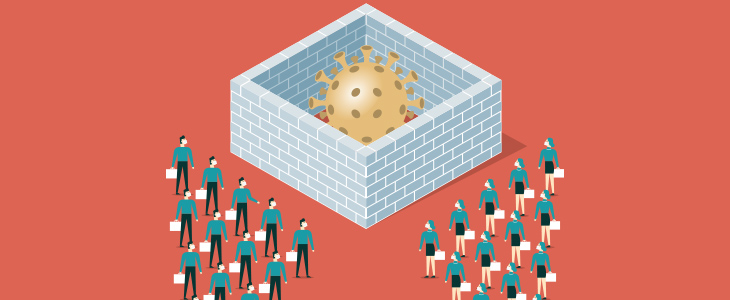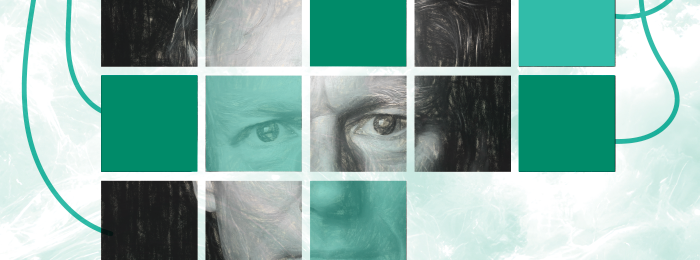
The anti-money laundering (AML) community was quickly abuzz with the frauds, scams and schemes criminals found to exploit during the COVID-19 crisis. Nearly all sectors, public and private, were quick to adapt their training and awareness programs. While it is natural to feel revulsion and disgust at the scoundrels trying to profit off this misery, do not let that distract you from the positive attributes this virus disruption can potentially provide the AML community. Yes, there is a silver lining! This may be a unique opportunity to bring clarity to many parts of the AML picture.
Just as the shutdowns, social distancing and measures to counter the spread of the virus have disrupted legitimate businesses, these measures did the same, and maybe even more, for illicit ones. With casinos, restaurants, salons and the plethora of other businesses commonly used by money launderers shut down, how these places weather the storm can easily provide indicators and behaviors that help separate the legitimate from the illegitimate. Businesses and subjects with revenues and other financial activities that were illicit in nature will now vary widely from the legitimate ones struggling within a changed financial environment.
To identify these anomalies, the AML community will need to adapt and tweak some analytics. While the public openly debates the “new normal” following the initial crisis, the AML community will also need to establish a new normal—a virus response created for businesses and financial activities. Those businesses that were mere fronts, were trade-based or third-party money launderers will likely exhibit activities and indicators in the near future that are identifiably different from their legitimate counterparts. Probably the most observable will be bars, clubs and restaurants. If the revenues in most restaurants are dropping by double digits because of the current COVID-19 environment, it would certainly be suspicious if any are still making profits.
There will be other anomalies, sometimes a bit less obvious, all over the AML world. With places like casinos shut down, many money launderers’ activities and lifestyles were disrupted far beyond recreational players losing a social entertainment outlet. For many money launderers, the casino environment is often a part of the (albeit illicit) business scheme and this perceived lifestyle is part of that persona. In general, the behavior of subjects and conspirators had to change and adapt differently from other legitimate business plans. While traditional surveillance to observe these adjustments has its investigative dividends, a closer look at the financial behaviors can pay dividends as well.
Microtransactional analysis will likely produce macroinvestigative results. Do not forget that Do not forget that although money laundering may transpire in an open business environment, a successful investigation will eventually come down to the behaviors of individuals. Individual behaviors will tend to stand out because of the COVID-19 response. Consider money couriers: they would now stand out due to the extreme drop in air travel. Even driving between states can now attract unnecessary law enforcement attention. Investigators need to anticipate the alternatives these individuals may turn to and seek new indicators that might uncover what they are actually doing.
In many cases, money launderers will likely have to leave their comfort zones and devise alternative plans or schemes. Each alternative will result in actions and activities that can potentially further identify and expose these schemes. For example, couriers could alternatively send money through a wire transfer. By doing that, the anonymity and lack of documentation at each end will now be compromised. Doing so will also require a cash deposit from the sender and withdrawal from the receiver. Thus, there will now be documentation and identification leading to potential AML alerts that had not previously existed.
These subjects could also opt for package shipments but using the mail or private parcel companies has its own inherent problems. Once again, transactional data, identities and addresses are documented where they have not been in the past. These changes in method modify the illicit AML scheme but not the intent. However, this unfamiliar territory for the culprits is prime territory for savvy AML investigators.
Nearly all existing money laundering and financial crime schemes will need alternative actions in response to the disrupted legitimate economic activity used for cover. If wine and spirit sales are any indication, the market for illicit drugs has likely increased as well. Traditional meeting and sales locations for those illicit transactions have to adjust just as restaurants had to revert to carry-out, delivery or drive-thru. Both the dealer and customer will now be engaged in activities and behaviors outside of their established norms. Again, this creates an opportunity and an advantage for investigations.
Also, consider that human traffickers cannot openly operate front businesses like massage parlors with their “speak-easy” prostitution side business. Will there be identifiable indicators to expose when the expense of “harboring” an illegal workforce overtakes the lack of revenue? While the narcotics trade may reflect an increase in demand, the prostitution business in general will likely suffer a severe downturn. It is hard for these workers to be “working late” when they are working from home.
International illicit markets are equally vulnerable to disruptions as well. International shipments in and out of China will fall under greater scrutiny to address new safety concerns. More priorities on what gets shipped and when means that contraband is more likely be identified or interdicted. There will also be businesses created or compromised to support the profits and activities of the various COVID-19 fraud schemes. Phony tests, counterfeit meds, masks and various other virus schemes will need to hide proceeds in this abnormal business environment.
While flattening the curve of COVID-19 is the goal of the healthcare world, this may be an excellent opportunity to spike the curve of identifiable AML activities. Analyzing suspicious activity reports in the post-COVID-19 world will not necessarily create a “new normal” but may help better define the normal that better separates legitimate from illegitimate activities.
So do not remove the AML thinking cap when putting on a face mask. COVID-19 will be speaking AML for the foreseeable future. Be part of that conversation.
Disclaimer: The views expressed are solely those of the author and are not meant to represent the opinions of the W/B HIDTA.










